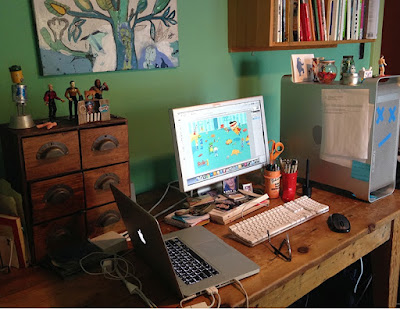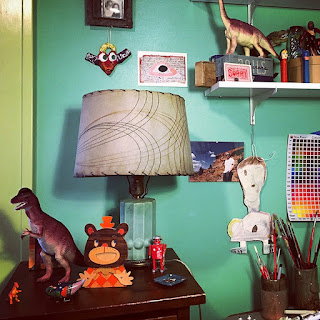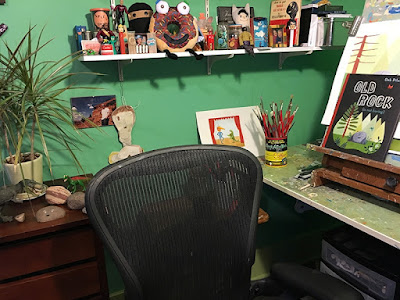Describe your illustration style in ten words or less.
Usually quirky or humorous. Hopefully evolving.
What items are an essential part of your creative space?
A laptop and large monitor, easel, paints, pencils and crayons, a scanner, toys and things
I like to look at vintage packaging or colourful buttons.
Do you have a favourite artistic medium?
I usually work with gouache. I love the smell, the texture and consistency of the paint and the little tubes that it comes in. I will often use it with other mediums, like coloured pencils, neocolour crayons and digital.
Which artistic period would you most like to visit and why?
I don’t know about a specific period, but I’m always drawn to outsider art, or folk art of a particular culture. It’s often so personal and visceral and specific to a place or experience.
Who or what inspired you to become an illustrator?
My mother was an art teacher and we did a lot of art projects with her, but I also watched a lot of TV when I was a child. I credit Bugs Bunny, Daffy Duck, Chuck Jones and Jay Ward as my first teachers in design, storytelling and animation. Still, I didn’t realize it was something I wanted to do until much later, so I worked as a graphic designer for many years before I ventured into illustration.
Deb Pilutti writes and illustrates for children. She feels lucky to have a job where reading, playing with toys and watching cartoons is considered “research.” Before becoming an author & illustrator, Deb was a graphic designer and created toys for Oliebollen.com and graphics for SeaWorld and Warner Brothers theme parks.
For more information, please visit Deb's website.
Name three artists whose work inspires you.
I love the humor and candor in Maira Kalman’s work. She taps into relatable feelings and emotions. I’m drawn to the sparse and graphic illustrations of Alice and Martin Provensen. They are pros at distilling images to the simplest form, something I try to work toward. Eyvind Earle created ethereal landscapes and concept art for many of the Disney films. His use of colour and value is illuminating.
I love the humor and candor in Maira Kalman’s work. She taps into relatable feelings and emotions. I’m drawn to the sparse and graphic illustrations of Alice and Martin Provensen. They are pros at distilling images to the simplest form, something I try to work toward. Eyvind Earle created ethereal landscapes and concept art for many of the Disney films. His use of colour and value is illuminating.
Which artistic period would you most like to visit and why?
I don’t know about a specific period, but I’m always drawn to outsider art, or folk art of a particular culture. It’s often so personal and visceral and specific to a place or experience.
Who or what inspired you to become an illustrator?
My mother was an art teacher and we did a lot of art projects with her, but I also watched a lot of TV when I was a child. I credit Bugs Bunny, Daffy Duck, Chuck Jones and Jay Ward as my first teachers in design, storytelling and animation. Still, I didn’t realize it was something I wanted to do until much later, so I worked as a graphic designer for many years before I ventured into illustration.
Can you share a photo of your creative work space or part of the area where you work most often? Talk us through it.
I have a big messy wooden table that I always have to clear off when I want to draw. (Sometimes I do my sketching at the dinner table so that I can spread out more.) my laptop and monitor are also on the table and I will composite work digitally there and prep for printing. My easel is in a nook. I like to paint standing up because I feel like I put more energy into the work.
I have a big messy wooden table that I always have to clear off when I want to draw. (Sometimes I do my sketching at the dinner table so that I can spread out more.) my laptop and monitor are also on the table and I will composite work digitally there and prep for printing. My easel is in a nook. I like to paint standing up because I feel like I put more energy into the work.
What is your favourite part of the illustration process?
Painting the final. Once the layout is done and a digital colour study made, I can turn the music up loud and work at my easel. It’s gratifying to see an illustration emerge from the process.
What advice would you give to an aspiring illustrator?
Work harder than necessary. In an effort to grow, I started paying attention to the work habits of artists and professionals whose work I admired. One of the things I noticed is that they often will rework a piece of art or a story that I think is already pretty great. Their art director and editor may be perfectly happy with it. I would be happy with it. But the artist is not satisfied and keeps pushing and self-editing. And when I see the finished product, I realize they were right. It is even better.
Deb Pilutti writes and illustrates for children. She feels lucky to have a job where reading, playing with toys and watching cartoons is considered “research.” Before becoming an author & illustrator, Deb was a graphic designer and created toys for Oliebollen.com and graphics for SeaWorld and Warner Brothers theme parks.
For more information, please visit Deb's website.
from Kids' Book Review https://ift.tt/3EoXz14











No comments:
Post a Comment